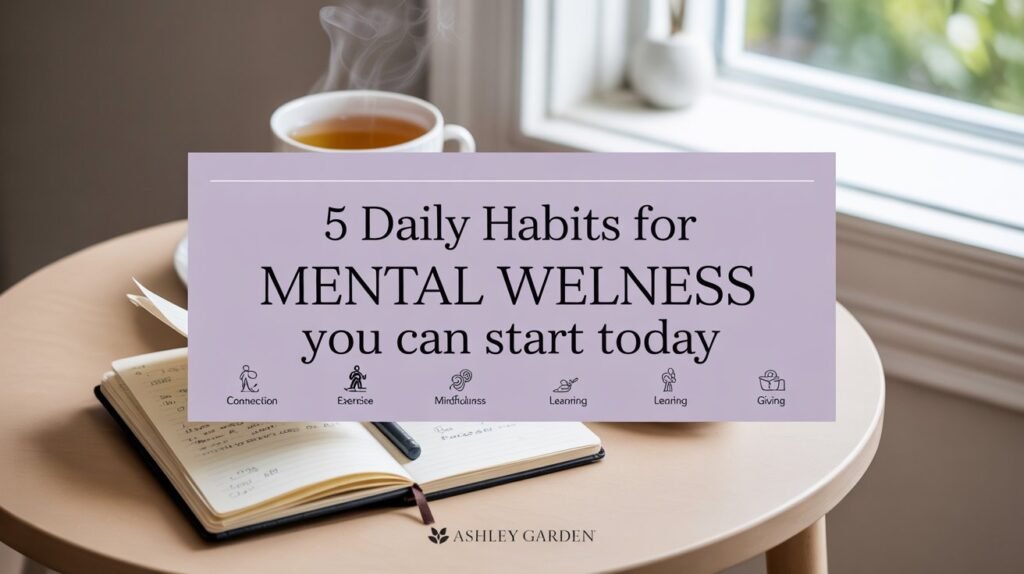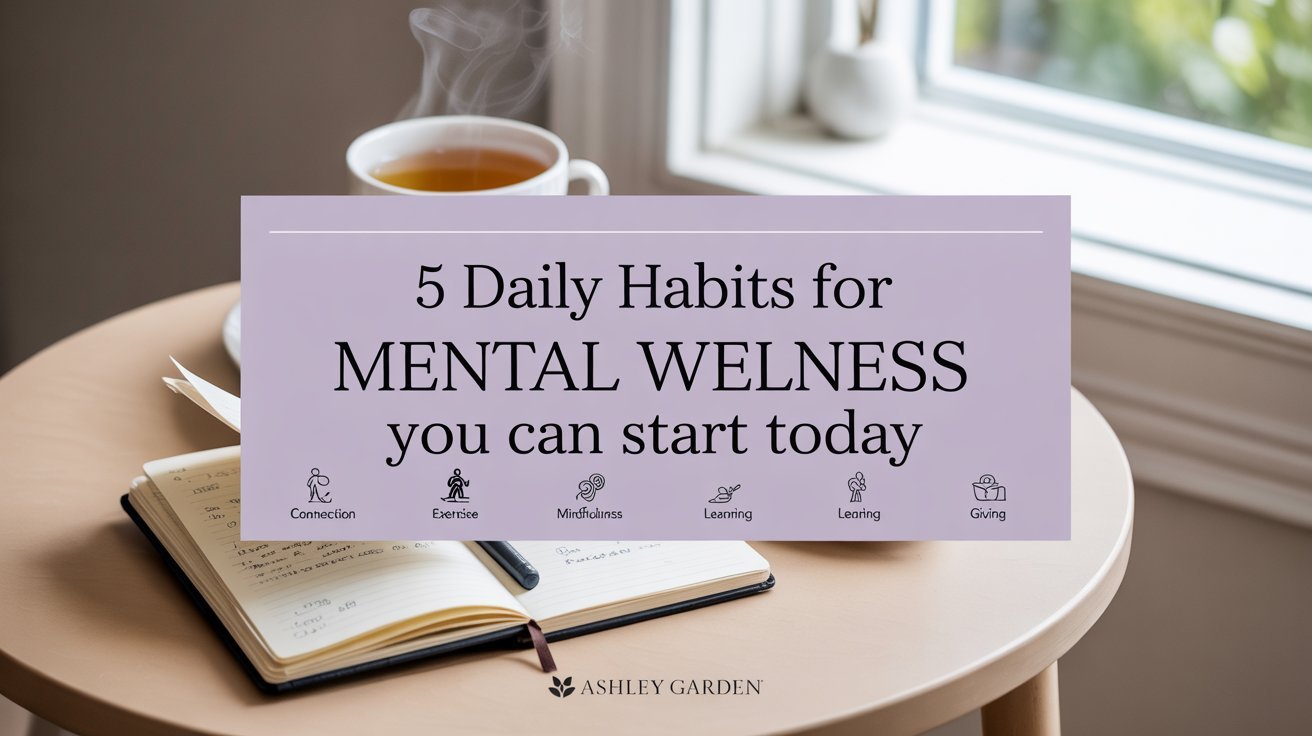Hey there! I’m Ashley Scott, and I’ve been gardening for 10 years now. It’s not just a hobby for me; it’s a way of life that has taught me so much about mental wellness. You see, gardening isn’t just about growing plants; it’s about growing yourself. Over the years, I’ve discovered five daily habits that have significantly improved my mental wellness, and I believe they can do the same for you.
These healthy habits for mental wellness are simple yet powerful. They don’t require fancy equipment or hours of your time, but when practiced consistently, they can make a world of difference in how you feel mentally and emotionally. Plus, as a gardener, I’ve found ways to tie these habits into my gardening routine, which makes them even more enjoyable.
So, let’s dive into these five daily mental wellness habits you can start today!

Habit 1: Connect with Others

Why It Works
Humans are social creatures. We thrive on interactions with others. Research suggests that strong social connections can lower rates of anxiety and depression, improve self-esteem, and even boost your immune system. When you feel connected, you feel valued and supported, which is essential for mental and emotional wellness.
How to Do It
- Spend quality time with family or friends—maybe have dinner together or play a game.
- Join a club or group that interests you, like a book club or a sports team.
- Volunteer in your community, such as at a local school or charity.
- Use phone calls or video chats to stay in touch with loved ones who are far away.
Gardening Connection
Gardening is a fantastic way to build good habits for physical and mental wellness through social connections. I often invite friends or family to help me plant or harvest in my garden. We chat, laugh, and share tips while digging in the dirt. It’s a great way to bond! I also love participating in community garden projects, where people from all walks of life come together to grow food and build friendships. Sharing your harvest with neighbors is another simple way to connect—it’s amazing how a fresh tomato can spark a conversation!
Explore how community gardening strengthens social bonds on my blog.
For more on the benefits of social connections, check out this article from Stanford University and this research paper from PMC.
Habit 2: Be Physically Active

Why It Works
Exercise isn’t just great for your body; it’s a game-changer for your mind. Regular physical activity can reduce stress, anxiety, and depression while boosting your mood through endorphins—those “feel-good” chemicals. It also improves sleep and energy levels, making it a key part of building habits for mental and emotional wellness.
How to Do It
- Find an activity you enjoy, like walking, jogging, yoga, or dancing.
- Aim for at least 30 minutes of moderate exercise most days of the week.
- Don’t feel pressured to go all-out—even small movements add up!
Gardening Connection
For me, gardening is my daily dose of exercise. Digging, planting, watering, and weeding are all physical tasks that get my heart pumping. Before I know it, I’ve worked up a sweat and feel energized. It’s like a workout without the gym! If gardening isn’t your thing, try a brisk walk or a fun dance session in your living room. The goal is to move your body in a way that feels good.
For more on how exercise boosts mental health, read this article from HelpGuide.org and this scientific review from NCBI.
Habit 3: Learn New Skills

Why It Works
Learning something new is like giving your brain a workout. It keeps your mind sharp, boosts self-confidence, and gives you a sense of accomplishment. Research shows that learning new skills can improve mental wellness by fostering a sense of purpose and connection. It’s also a fun way to keep your brain active!
How to Do It
- Try a new hobby, like painting, cooking, or playing an instrument.
- Sign up for a class or workshop that sparks your interest.
- Set small goals, like learning a new recipe or a gardening technique.
Gardening Connection
In gardening, there’s always something new to learn. Every season brings fresh challenges and opportunities. Last year, I decided to grow exotic vegetables, and it was a blast! I researched their soil needs, pest protection, and care routines. It was a learning curve, but I loved every minute. You don’t have to stick to gardening—try learning a new language or a craft. The key is to challenge yourself and step out of your comfort zone.
To learn more about the mental health benefits of learning, visit Upskilled.edu.au and NHS inform.
Habit 4: Give to Others

Why It Works
Giving to others—whether it’s your time, skills, or resources—can have a profound impact on your mental health. It makes you feel good about yourself and connects you with others in a meaningful way. Studies suggest that acts of kindness and generosity can reduce stress, increase happiness, and even improve physical health.
How to Do It
- Volunteer at a local charity, food bank, or community organization.
- Help a neighbor with a task, like carrying groceries or mowing their lawn.
- Donate items you no longer need, like clothes or books.
- Share your skills, like teaching someone a recipe or a gardening tip.
Gardening Connection
In my gardening practice, I love sharing the produce I grow with friends and neighbors. There’s nothing like giving someone a fresh tomato or a bunch of herbs you’ve grown yourself—it brings joy to both of us! I also volunteer at local food banks, helping distribute fresh produce to those in need. It’s rewarding to know my efforts make a difference. Giving doesn’t have to be big; small acts of kindness count too.
Habit 5: Pay Attention to the Present Moment (Mindfulness)

Why It Works
Mindfulness is about being fully present in the moment, without judgment. It’s noticing your thoughts, feelings, and surroundings. Practicing mindfulness can reduce stress, improve focus, and enhance mental wellness. It’s like giving your mind a break from constant worries.
How to Do It
- Try deep breathing exercises for a few minutes each day.
- Practice meditation, even if it’s just focusing on your breath.
- Engage your senses—notice the sounds, smells, and textures around you.
- Be fully present in everyday activities, like eating or walking.
Gardening Connection
Gardening is inherently mindful. When I’m in the garden, I focus on the task at hand—planting seeds, pruning plants, or observing growth. I notice the feel of the soil, the smell of the earth, and the sounds of nature. It’s a form of meditation that grounds me. If gardening isn’t for you, try mindful eating or a mindful walk. The goal is to stay present.
Learn about mindful gardening on my blog.
For more on mindfulness and its benefits, visit NIH News in Health and Mayo Clinic.
Conclusion
Incorporating these five mental wellness habits into your daily life can transform how you feel. You don’t need to do them perfectly—just start small and be consistent. Whether it’s connecting with friends, staying active, learning something new, giving to others, or practicing mindfulness, these habits can lead to a happier, healthier you.
As a gardener, I’ve found that tying these habits to gardening makes them even more rewarding. If you’re curious about how gardening can boost your mental health, explore more articles on my blog, ashleygarden.blog. Mental wellness is a journey, so be kind to yourself and enjoy the process!

Leave a Reply